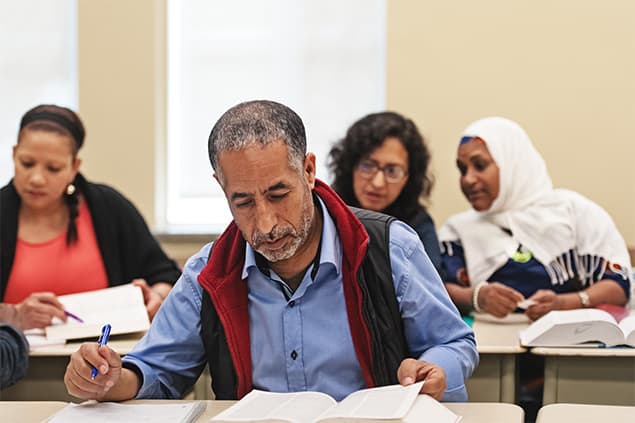There is a stereotypical image attached to the refugees that they’re a vulnerable group who need continuous support to do better in life. However, this is not always true. The reality is that there are many refugees who are skilled, as well as educated, but due to their displacement they do not have an opportunity to contribute. Often because of their forcible displacement, they do not get a chance to carry their academic or work documents, which might have helped them to secure an employment opportunity in another country.
Moreover, as per UNHCR’s report, some students reluctantly discontinue their studies as they have to continually move from one place to another. Nonetheless, skills and talent are intangible, and cannot be left behind. Besides, most of these refugees have willingness to contribute to society if given the chance. With that economic potential and enthusiasm to contribute, skilled refugees may have pathways out of displacement beyond traditional refugee resettlement via complementary pathways.
UNHCR defines complementary pathways as “…safe and regulated avenues that complement refugee resettlement…” Complementary pathways provide an opportunity to migrate based on the potential to contribute skills, and talent to a host country. In December 2019 at Global Refugee Forum, Talent Beyond Boundaries (TBB), brought forward several pledges urging employers, government, and civil society to hire refugees, examine economic migration pathways, and support refugees’ economic integration. TBB is working alongside the government of Canada to test a model of economic immigration for skilled refuges, whose talents are in demand in the local market.
Canada launched this pilot project, administered by Immigration, Refugees and Citizenship Canada (IRCC) in collaboration with UNHCR, RefugePoint, TBB, and participating provinces and territories (Yukon, Manitoba, Ontario, Nova Scotia and Newfoundland and Labrador). This project is known as the Economic Mobility Pathways Project, which aims to identify 10 to 15 skilled refugees with strong economic settlement potential to apply for immigration to Canada under a federal economic program or Provincial Nominee Program.
Emphasizing the importance of complementary pathways, Dana Wagner, Canada Director of TBB said, “There are many thousands of refugees worldwide who could fill in-demand jobs in companies and communities in need of talent. People living in displacement have been invisible to the global labour market and face structural barriers to skills-based mobility. Opening these opportunities will allow refugees to use their skills to move to a secure future.”
TBB has seen many success stories since it began work on this pilot, one such example is Anas Nabulsy, who lived in Lebanon with his family as a refugee for years and then moved to Canada as a skilled worker. He has a mechanical engineering background and is currently employed as a tool and die maker at Davert Tools in Niagara Falls, Ontario. Sharing his happiness, Anas, said, “Since I came to Canada, everything has changed. I feel like I’m born again. I will not worry about my son’s future anymore.”
There are many skilled refugees like Anas all over the world who just need an alternative pathway to move to another country. These people have enough skills for their self-sustenance but being displaced hinders their progress. TBB connects such refugees with their prospective employers and highlights their skills. These are critically important opportunities for refugees to move beyond their situation of displacement.
Ahmed Hussen, former Minister of Immigration, Refugees and Citizenship, said, “Instead of thinking of refugees as people who just want resettlement and people who are passive recipients of aid, how about re-imagining refugees as people who have assets to contribute, who have talents and skills that we need in Canada?”
As per TBB’s report, labour mobility for refugees requires collaboration; not just of governmental institutions, but also of private sector players and civil society. They all need to work collectively for eradicating the barriers for skilled refugees to enter the labour market, contribute their skills, and build meaningful lives.
Questions? Comments? Tell us what you think here.



